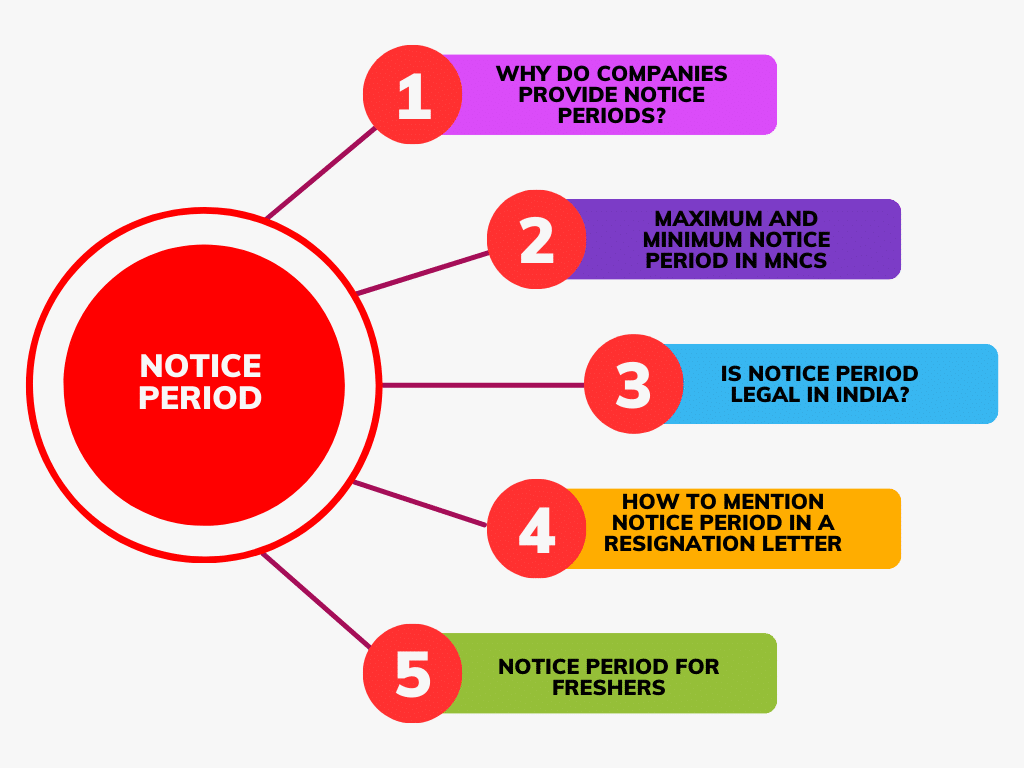What is a notice period? Meaning and All About Notice Period
Table of Contents
What is a Notice Period?
Notice period is the duration of time an employee must provide to their employer before they leave a job. It is essentially a formal announcement that the employee will be resigning from their position. During this time, the employee is still working and may be involved in handing over their responsibilities, training replacements, or completing pending work.
The length of a notice period is generally stated in the employment contract or company policy. It can range from a few days to several months depending on the level of seniority, job role, or company standards.

Why Do Companies Provide Notice Periods?
Notice periods serve both employees and employers in several ways:
-
Business Continuity: It helps the employer maintain continuity in operations by giving them time to hire and train a replacement or redistribute tasks among other employees.
-
Knowledge Transfer: The notice period is crucial for knowledge transfer. This is particularly important in technical roles, where an outgoing employee needs to pass on valuable information or train a new employee.
-
Legal and Contractual Obligation: Many employment contracts, especially in MNCs, require a specific notice period, making it a legal obligation that must be fulfilled to avoid penalties.
-
Mutual Respect: Providing notice fosters professional respect. It gives the company time to make arrangements and ensures the departing employee leaves on good terms, which could be valuable for future references or rehire opportunities.
Maximum and Minimum Notice Period in MNCs
The length of notice periods can vary greatly depending on the company and industry:
-
Minimum Notice Period: In most MNCs, a minimum notice period is 15 to 30 days. For junior or entry-level roles, this duration is usually enough for a smooth transition.
-
Maximum Notice Period: In senior management or technical roles, the notice period can go up to 90 days (3 months) or more. In certain executive positions, it can be even longer to ensure an orderly transition.
Some companies also offer the option of “buying out” the notice period, where the employee pays for the remaining days if they wish to leave earlier than the agreed period.
Is Notice Period Legal in India?
Yes, notice periods are legal in India and are often mandated by the Industrial Employment (Standing Orders) Act, 1946, and company-specific policies or employment contracts. These laws allow for mutually agreed notice periods between employers and employees. However, certain rules apply:
-
For Permanent Employees: As per legal standards, a notice period of 1 month is generally required for permanent employees, though some companies may extend it to 2 to 3 months for higher roles.
-
For Temporary or Contract Employees: The notice period might be shorter or negotiable depending on the terms of the contract.
-
For Probationers or Freshers: Employees under probation or those with less experience may have a shorter notice period, often ranging between 7 to 30 days.
It is also legal to offer notice pay in lieu of the notice period, where the employee or employer compensates the other party instead of serving the full notice.
How to Mention Notice Period in a Resignation Letter
When drafting a resignation letter, it’s important to clearly mention the notice period. Here’s how:
-
Start with a formal resignation: Clearly state your intention to resign.
-
Mention the notice period: Specify the date of your last working day, adhering to the agreed notice period. For example:
“As per my employment contract, I am required to serve a 30-day notice period. My last working day will be [date].”
-
Offer cooperation: State your willingness to assist during the transition period, such as helping with the handover or training replacements.
Example: “I would like to formally resign from my position as [Job Title] at [Company Name], effective [today’s date]. As per my employment agreement, I will be serving a 60-day notice period, with my last working day being [last working day]. I am happy to assist in any way to ensure a smooth transition during this period.”
Notice Period for Freshers
For freshers, especially those on probation, the notice period is typically shorter compared to more experienced employees. It can range from 7 to 30 days. During probation, companies may allow immediate resignation or shorter notice periods since the employee is still in the initial stages of employment and hasn’t accumulated critical responsibilities.
However, once confirmed as a permanent employee, freshers may have to abide by longer notice periods, often between 1 to 3 months, depending on company policies.
Factors that Affect Notice Period in MNCs
- Job Level: Senior executives or highly technical roles often have longer notice periods.
- Employment Agreement: The notice period is explicitly mentioned in the employment contract, which is legally binding.
- Company Policy: Larger organizations, especially MNCs, have standardized notice periods. This can vary depending on the region and local labor laws.
- Project Criticality: Employees working on important or ongoing projects may be required to serve longer notice periods to ensure proper handover.
- Mutual Agreement: Sometimes notice periods can be negotiated. If the employer feels the employee’s early departure won’t harm operations, they may agree to a shorter notice period.
Is notice period negotiable
1. Mutual Agreement
An employee and employer can come to a mutual agreement to reduce the notice period. If the employer feels that the employee’s immediate departure won’t cause significant disruption to operations or if they have already found a replacement, they may allow the employee to leave earlier.
2. Notice Period Buyout
Many companies offer a notice period buyout option. In this case, the employee can pay for the remaining notice period instead of serving it. The amount is usually equivalent to the salary for the remaining notice period. The buyout option may also be offered by the new employer to expedite the joining process.
3. Project Completion
If an employee is leaving during a less critical phase of a project or when tasks can easily be handed over, the employer may agree to a shorter notice period.
4. Personal Circumstances
In certain cases, such as family emergencies or health reasons, employers may show leniency and reduce the notice period based on humanitarian grounds.
5. For Senior-Level Positions
In senior or critical roles, it may be harder to negotiate a shorter notice period due to the responsibilities involved. However, it can still be negotiated if there’s a clear plan for handover and a smooth transition.
6. Probation Period
During the probationary period, notice periods are often shorter and easier to negotiate. Companies may allow freshers or probationers to leave with minimal notice.
7. Non-Availability of a Replacement
Sometimes, if an immediate replacement isn’t available, employers may not agree to a shorter notice period, especially if the employee holds a critical role. However, negotiations can still take place if the employer can be assured of a smooth handover.

